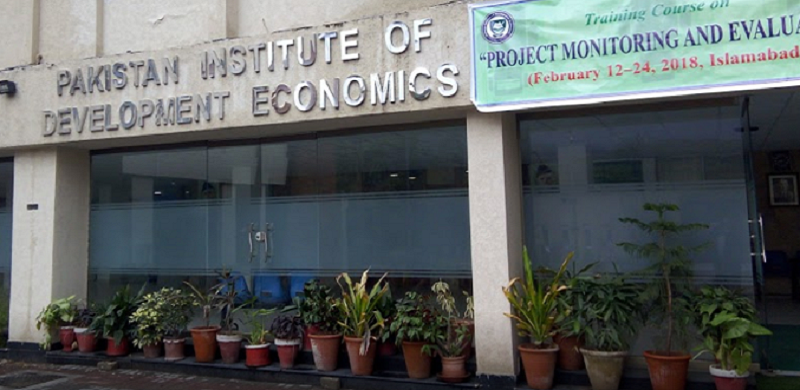
An emphasis on education was crucial to the Pakistan movement ever since the time of Sir Syed and the Aligarh institution. All the stalwarts of the Pakistan movement stressed the importance of education. Quaid-e-Azam, especially, laid great emphasis on it in his speeches.
Pakistan is facing huge challenges when it comes to higher education. This is most starkly visible when we consider the fact that the number of students enrolling in institutions of higher learning has reached unprecedented levels, and yet the quality of education has not been upgraded. It was in this context that the Pakistan Institute of Development Economics (PIDE) organized a webinar recently on the “Future of Higher Education in Pakistan.”
One of the guest speakers, Dr. Zain-ul-Abidin, who is the Director-General at the Research & Development Unit of the Higher Education Commission (HEC), was quite optimistic about the future of higher education in Pakistan. He emphasized that the level of exploration in the field of education has already brought to our attention many deep-rooted issues such as the relevance of educational programs being offered and their quality.
However, any such efforts remain handicapped by a relative paucity of resources for education. Currently, the budget allocated i.e Rs. 77.262 billion in the federal budget 2019-20, which is now 20.5% reduced, has significantly affected the quality of education in Pakistan.
China's development model, often cited in developing countries, relied on a heavy state investment in education – including the ability to generate top-quality research. Now, Pakistan's HEC is working hard to develop and run educational programs that are oriented towards being relevant to industries and developing the most vital skills.
We simply cannot achieve these designated goals unless universities start working as anchors of change in society. It is often hoped that they might produce policy-makers up to the ministerial level – and yet, for instance, we often struggle to find a single economist who could be assigned the role of finance minister.
Pakistani society's class divides are reflected most strongly in educational access and opportunities. Our very standards of education are divided: with students of British O/A levels often seen as brighter than the students of the state's own Matric/FS.c system. This culture creates a dichotomy in society – and in the final analysis affects educational outcomes and the possibility for research. Those who received a better and more marketable education simply move out of the country, leading to the oft-mentioned brain drain.
Asymmetries and inequalities in access to education are seen just as much in a gender gap. One of the participants at the webinar highlighted a study in which it was claimed that even with an education up to merely Matric level, Pakistani women would be much better equipped to handle maternity-related health problems and infant mortality.
We need a uniform education system - which could be a solution to the problems of our education system. But before any strategy can work, we need a change of mindset from the policy-makers down to the basic units of society.
The author is pursuing her Mphil in Econometrics at the Pakistan Institute of Development Economics (PIDE), Islamabad
Pakistan is facing huge challenges when it comes to higher education. This is most starkly visible when we consider the fact that the number of students enrolling in institutions of higher learning has reached unprecedented levels, and yet the quality of education has not been upgraded. It was in this context that the Pakistan Institute of Development Economics (PIDE) organized a webinar recently on the “Future of Higher Education in Pakistan.”
One of the guest speakers, Dr. Zain-ul-Abidin, who is the Director-General at the Research & Development Unit of the Higher Education Commission (HEC), was quite optimistic about the future of higher education in Pakistan. He emphasized that the level of exploration in the field of education has already brought to our attention many deep-rooted issues such as the relevance of educational programs being offered and their quality.
However, any such efforts remain handicapped by a relative paucity of resources for education. Currently, the budget allocated i.e Rs. 77.262 billion in the federal budget 2019-20, which is now 20.5% reduced, has significantly affected the quality of education in Pakistan.
China's development model, often cited in developing countries, relied on a heavy state investment in education – including the ability to generate top-quality research. Now, Pakistan's HEC is working hard to develop and run educational programs that are oriented towards being relevant to industries and developing the most vital skills.
We simply cannot achieve these designated goals unless universities start working as anchors of change in society. It is often hoped that they might produce policy-makers up to the ministerial level – and yet, for instance, we often struggle to find a single economist who could be assigned the role of finance minister.
Pakistani society's class divides are reflected most strongly in educational access and opportunities. Our very standards of education are divided: with students of British O/A levels often seen as brighter than the students of the state's own Matric/FS.c system. This culture creates a dichotomy in society – and in the final analysis affects educational outcomes and the possibility for research. Those who received a better and more marketable education simply move out of the country, leading to the oft-mentioned brain drain.
Asymmetries and inequalities in access to education are seen just as much in a gender gap. One of the participants at the webinar highlighted a study in which it was claimed that even with an education up to merely Matric level, Pakistani women would be much better equipped to handle maternity-related health problems and infant mortality.
We need a uniform education system - which could be a solution to the problems of our education system. But before any strategy can work, we need a change of mindset from the policy-makers down to the basic units of society.
The author is pursuing her Mphil in Econometrics at the Pakistan Institute of Development Economics (PIDE), Islamabad
